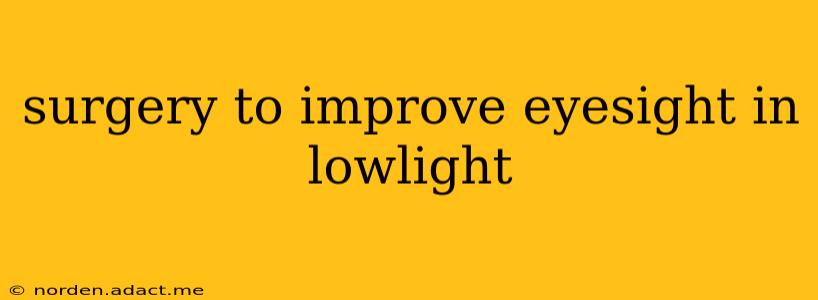Seeing clearly in low-light conditions is a common desire, and while some people are naturally better at it than others, advancements in medical technology are constantly pushing the boundaries of what's possible. This article explores surgical and non-surgical options aimed at enhancing night vision. We'll also address some frequently asked questions surrounding this topic.
What Surgeries Can Improve Night Vision?
Currently, there isn't a single surgical procedure specifically designed to dramatically improve night vision in the way that LASIK corrects refractive errors. The ability to see in low light is complex, involving multiple factors beyond simply the refractive power of your eye. However, certain surgical interventions can indirectly improve night vision in specific situations:
Cataract Surgery: A Significant Indirect Improvement
Cataract surgery is the most common procedure that often leads to improved night vision as a side effect. Cataracts, the clouding of the eye's lens, significantly reduce the amount of light reaching the retina. Removing a cataract and replacing it with an artificial intraocular lens (IOL) can dramatically improve vision, including night vision, particularly in older adults. Some IOLs are specifically designed to enhance light transmission and improve vision in dim light, although this isn't their primary function.
Corneal Surgery for Specific Issues
In some cases, certain corneal conditions can negatively affect night vision. Procedures aimed at correcting these conditions, such as corneal transplants or refractive surgeries for irregular astigmatism, might lead to some improvement in low-light vision as a secondary benefit. However, these surgeries primarily address the underlying corneal issue, not night vision directly.
What About Non-Surgical Options?
While surgery plays a limited role in directly boosting night vision, several non-surgical options exist and often yield better results:
Nutritional Supplements: A Controversial Area
Some claim that specific vitamins and supplements can improve night vision. While a healthy diet rich in antioxidants (like lutein and zeaxanthin) is beneficial for overall eye health, there’s limited scientific evidence directly linking specific supplements to a significant enhancement of night vision. Always consult your ophthalmologist before taking any supplements.
Eyeglasses and Contact Lenses: Addressing Refractive Errors
Correcting refractive errors like myopia (nearsightedness), hyperopia (farsightedness), and astigmatism with glasses or contact lenses can significantly improve overall vision, including in low-light conditions. Sharper vision in general usually translates to better vision, even in the dark.
Can Surgery Restore Night Vision Lost Due to Injury or Disease?
The possibility of restoring night vision lost due to injury or disease through surgery depends heavily on the nature and extent of the damage. Some conditions, like retinal detachments or macular degeneration, may be partially treatable surgically, potentially leading to some improvement in night vision as a secondary outcome. However, complete restoration is not always possible. Each case requires individualized assessment and treatment planning by an ophthalmologist.
What are the Risks and Side Effects of Surgery for Improving Night Vision?
The risks and side effects associated with improving night vision surgically are primarily linked to the specific procedure performed (e.g., cataract surgery, corneal surgery). These risks can include infection, inflammation, bleeding, and changes in refractive error. Detailed discussions about these risks should take place with your ophthalmologist before any procedure.
Are There Any New Technologies or Research in This Area?
Research into enhancing night vision is ongoing. While major breakthroughs in surgical techniques are not currently on the horizon for dramatically improving night vision, technological advancements in areas like artificial vision and gene therapy hold potential for future progress in this field. However, these advancements are still in their early stages of development.
Conclusion
While no single surgery exists specifically to enhance night vision, some surgical procedures, such as cataract surgery, can indirectly improve low-light vision as a beneficial side effect. Other options, such as managing refractive errors with glasses or contacts, are more effective for addressing vision in low light conditions. Always consult with an ophthalmologist to determine the best approach for your specific situation. They can assess your individual needs and recommend the most appropriate course of action, whether that involves surgery or non-surgical approaches.
